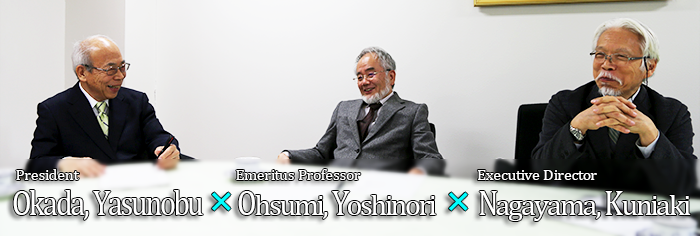[Interview] Professor, Emeritus Professor Ohsumi, Yoshinori No. 1


Meandering researcher life - exploring favorite fields with optimism and freedom
Interlocutor
- Ohsumi, Yoshinori (Emeritus Professor)
- Okada, Yasunobu (President)
- Nagayama, Kuniaki (Executive Director)
Nagayama Hello, everyone. My name is Nagayama, an Executive Director of SOKENDAI (The Graduate University for Advanced Studies).
Prof. Yoshinori Ohsumi has a close relationship with our university, as he has been a professor of the National Institute of Basic Biology and of SOKENDAI as well. So, I am particularly happy for his receiving Nobel Prize this time.
Today, we would like to hear what you are thinking about the current education and research environment, including how you had decided to walk as a researcher, and also advices to the faculty and students of SOKENDAI.
Okada Congratulations on the Nobel Prize for Physiology or Medicine.
We, all the faculty members, staffs and students are very proud of you.
Ohsumi Thank you.
Okada Actually, in the year you were assigned to the National Institute of Basic Biology in Okazaki city of Aichi prefecture, I was also assigned to the National Institute of Physiological Science(NIPS) next door, away from my family. I often saw you riding a bike and heading to your laboratory.
Ohsumi Yes, that's right.
Nagayama I was transferred from Komaba to the NIPS the following year. I feel a strange coincidence.
Nagayama We would like to hear how you decided to pursue the academic career. We understand that your father was also a researcher.
Ohsumi My father was a professor of the Faculty of Engineering, Kyushu University, so the hurdles to be a researcher was not high. My elder brother was also a researcher, but after the War, he changed his careers from science to liberal arts. I, myself, was not good at arts and sports, so if I recall now, it was more of a negative choice, or an elimination method, and it was not like I confidently chose this career. However, I didn't want to pursue the same engineering course as my father did.
I entered the Faculty of Science II of the University of Tokyo, but was not satisfied with the classes there. Then, the College of Arts and Science newly founded the Basic Science Department aiming at teaching science in general, and I had chosen that course without hesitation. From the time of the student I have been always positive about reorganizing organizations for inviting fresh air. Even now, that feeling hasn't changed.
Having met Dr. Kazutomo Imahori (Professor Emeritus, the University of Tokyo) in the new department triggered me to pursue molecular biology.
Nagayama After you finished your undergraduate course, you proceeded to the graduate school in 1967.
Ohsumi I was fortunate in the master course, as it was the time genetics and molecular biology developed greatly. In the doctoral course, I got engaged in the research on colicin which inhibits protein production of coliform bacilli.
However, my mentor, Dr. Akio Maeda was transferred to the Department of Biophysics in the Faculty of Science at Kyoto University, and since my second year of the doctoral course I 'studied abroad' within Japan. There were many outstanding people among the first graduates. Looking back now, I feel like I did not follow the proper procedure when I moved to Kyoto University. In those days, the operations in universities were more moderate. I feel that I was blessed with the times.
Okada You got married around that time.
Ohsumi My wife, Mariko, was a research student who was two years my junior. We started our married life in Kyoto, and a year later, our first son was born. When my wife got a job at the Institute of Life Science at Mitsubishi Kasei Corp. (current Mitsubishi Chemical Corp.), I transferred to the Faculty of Agriculture at the University of Tokyo, where Dr. Imahori was teaching, and I got a doctoral degree under Dr. Imahori as my wife supported my life.
Nagayama It is a heartwarming story that your wife supported your academic life. Nowadays we seldom hear such stories.
Ohsumi I appreciated that she let me keep doing a research I liked.
Nagayama Then, you went to the United States to study further.
Ohsumi I studied for three years under Dr. G.M. Edelman - a Nobel laureate. However, as he changed his research fields from immunology to developmental biology, I had to continue inseminations of mice which was unfamiliar to me, and it was a time I could not have much hope for the future. Fortunately, one year before I returned Japan I got the opportunity to collaborate on yeast. This is the first encounter with yeast.
Nagayama It was 1977 that you came back to Japan.
Ohsumi Dr. Yasuhiro Anraku of the Department of Botany at Faculty of Science, University of Tokyo invited me as an assistant. Dr. Anraku who was conducting a world-class study on the transport mechanism of coliform bacilli said to me, "As I will work on Escherichia coli, you work on yeast". After considering it, I decided to start research on the transport of vacuolar membranes which had not received much attention at the time. I basically did not like the world of competition that leads to the fact that the results of the research activities won and lost. I was strongly motivated to focus on fields that people can not handle. I do not know what will happen.
Nagayama Hearing your story, you seemed to walk on a lot of winding roads. Especially, in the United States there must be something that was frustrating due to uneasiness.
Ohsumi Every time I am trying to be optimistic and I feel like the road has opened up. The tolerance of the research environment at that time allowed me to continue studies I was interested in.
p.1/3
Related Content
